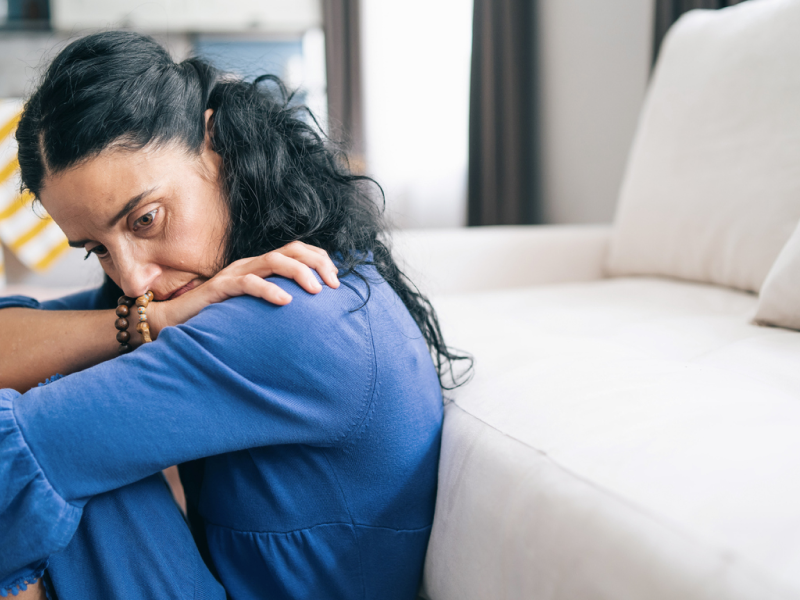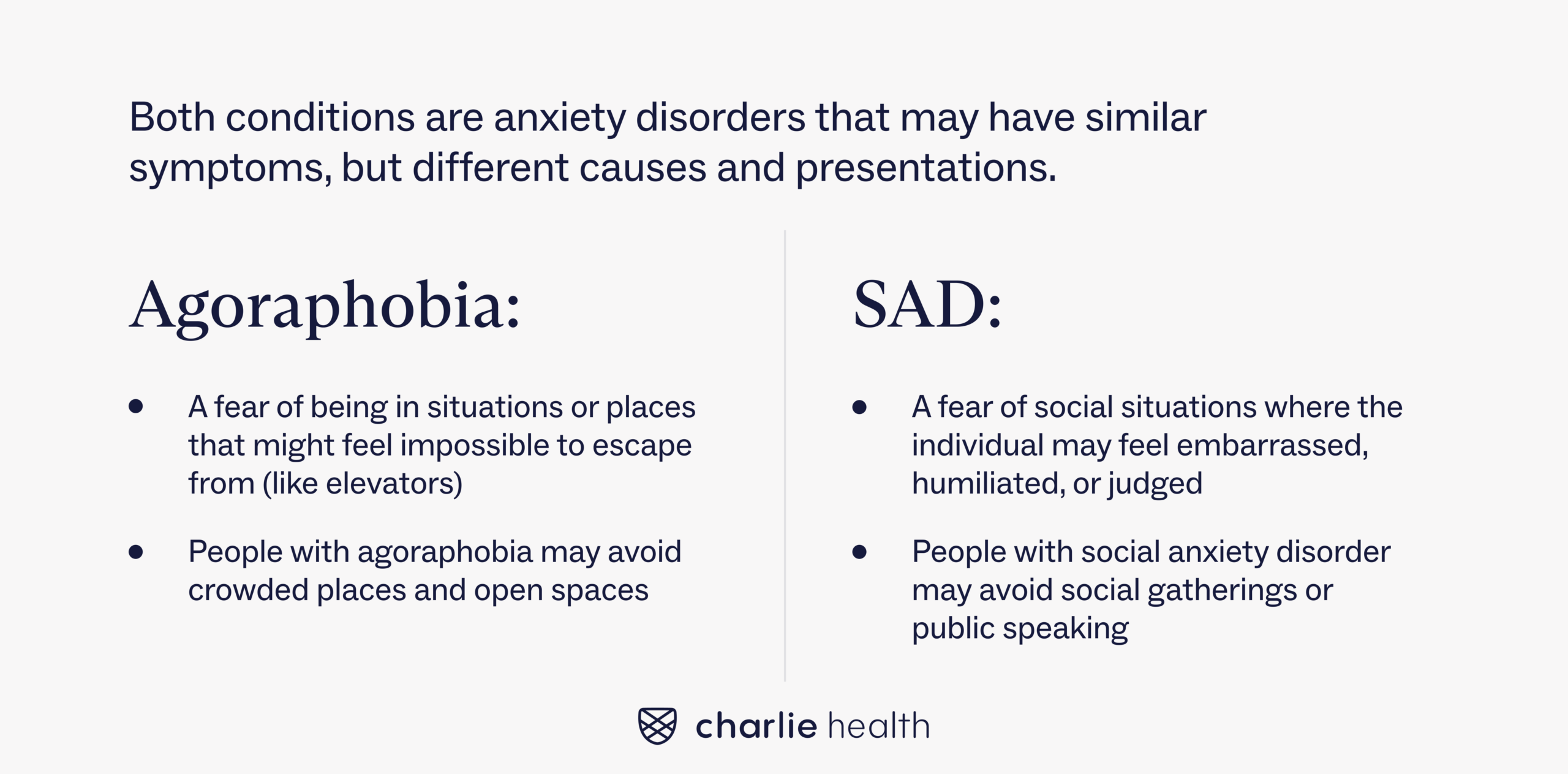
Table of Contents
Is It Social Anxiety Disorder or Agoraphobia?
Written By: Charlie Health Editorial Team

Clinically Reviewed By: Dr. Don Gasparini
Updated: February 28, 2024
5 min.
Social anxiety disorder and agoraphobia are anxiety-related conditions with different causes and implications in day-to-day life.
Learn more about our Clinical Review Process
Table of Contents

Social anxiety disorder and agoraphobia both involve intense fear and avoidance of certain situations: social settings and situations where leaving one’s house or escaping is challenging, respectively. While the anxiety-related conditions share some similar symptoms, they have different causes and implications.
Understanding the differences between social anxiety disorder and agoraphobia is crucial in providing appropriate treatment and support to those who are affected by these conditions. Below, we delve into the definitions and symptoms of social anxiety disorder and agoraphobia, outline the difference between the conditions, and highlight treatment options for both.

Personalized anxiety treatment from home
Build connections from your safe space
Social anxiety disorder definition and symptoms
Social anxiety disorder, also known as social phobia, is an anxiety disorder marked by an intense fear of social settings where one may feel judged. This often leads to the avoidance of social gatherings, public speaking, or interactions with strangers. These situations (or the fear of them) can cause panic attack-like symptoms such as sweating and shaking (though social anxiety disorder is different from panic disorder).
Agoraphobia definition and symptoms
Agoraphobia is an anxiety disorder marked by a fear of being away from home or in situations or places that might be challenging or impossible to escape from. This fear can lead to avoidance of crowded areas or public transport, resulting in spending more time at home. People with agoraphobia also may fear being alone or trapped.
Join the Charlie Health Library
Get mental health updates, research, insights, and resources directly to your inbox.
You can unsubscribe anytime.
Differences between social anxiety and agoraphobia
Social anxiety disorder and agoraphobia have common symptoms like anxiety, panic attacks, and avoidance behaviors but differ in their causes and implications. Below, we highlight five differences between social anxiety and agoraphobia.
Focus of fear
The fear in social anxiety disorder typically centers around social performance or evaluation in a social situation. Agoraphobia, by contrast, involves a fear of being in situations where escape might be difficult, or help might not be available in case of a panic attack or other anxiety symptoms. The fear is not necessarily social in nature but relates to feeling trapped or unable to escape.
Avoidance behaviors
People with social anxiety disorder and agoraphobia may both try to avoid certain situations or places, but the root of what they are avoiding differs. Those with social anxiety disorder try to avoid social situations or endure them with significant distress. People with agoraphobia may avoid leaving their homes, being alone, or being in public places without easy escape routes.
Impact on daily life
If left untreated, these conditions can have different implications for a person. Social anxiety disorder can significantly impair social and occupational functioning, leading to difficulties in forming relationships, attending school or work, and engaging in social activities. Agoraphobia can limit peoples’ ability to leave their homes or engage in activities outside their comfort zone, leading to social isolation, dependence on others, and functional impairment.
Prevalence
Social anxiety disorder is more commonly diagnosed as agoraphobia. About 7% of adults in the United States had social anxiety disorder in the past year, while less than 1% had agoraphobia during that time, data shows. However, social anxiety disorder may be more common than agoraphobia due to factors like easier recognition, a younger age of onset, more visible symptoms, less stigma, and greater treatment accessibility.

Causes
Social anxiety disorder and agoraphobia may both be caused by genetic or environmental factors, but some of the other causes differ. Social anxiety disorder may develop due to a stressful social event in early life or parents showing fear and avoiding social situations, along with being overly protective, National Institute of Mental Health research shows. Agoraphobia, by contrast, may be linked with a history of panic attacks, a tendency towards anxiety or phobic disorders, and stressful life events or trauma, according to experts at the National Institute of Mental Health.
Treatment options for social anxiety and agoraphobia
Living with social anxiety or agoraphobia requires navigating daily challenges while managing symptoms. However, help is available. Treating social anxiety disorder or agoraphobia typically involves a combination of therapy, lifestyle changes, and, in some cases, meditation. Here are some common treatment options for both conditions:
Therapy
Therapy for social anxiety disorder and agoraphobia often includes cognitive-behavioral therapy (CBT), exposure therapy, and mindfulness techniques. CBT helps people identify and challenge negative thoughts, while exposure therapy gradually confronts feared situations to reduce avoidance. Also, mindfulness practices encourage present-moment awareness and acceptance of thoughts and feelings, which can lower anxiety levels in a triggering situation, like a social event or on public transportation. It’s important to work with a mental health professional to create a personalized treatment plan.

Medication
Selective serotonin reuptake inhibitors (SSRIs) and serotonin-norepinephrine reuptake inhibitors (SNRIs) are commonly prescribed medications for social anxiety disorder and agoraphobia. These medications can help alleviate symptoms of anxiety and depression by increasing levels of neurotransmitters in the brain. Beta-blockers may be prescribed to manage physical symptoms of anxiety, such as rapid heartbeat, trembling, or sweating, particularly in situations where performance anxiety is a concern (like a social situation requiring public speaking).
Lifestyle changes
Engaging in regular exercise, practicing relaxation techniques (deep breathing, progressive muscle relaxation, etc.), maintaining a healthy diet, prioritizing adequate sleep, and reducing caffeine and alcohol consumption can help manage symptoms of anxiety and improve overall well-being.
Treatment for anxiety disorders at Charlie Health
If you or a loved one are struggling with anxiety or a specific phobia, Charlie Health is here to help. Charlie Health’s virtual Intensive Outpatient Program (IOP) provides more than once-weekly mental health treatment for teens and adults with serious mental health conditions, including those dealing with generalized anxiety disorder and other anxiety disorders. Our expert clinicians incorporate evidence-based therapies into individual counseling, family therapy, and group sessions. With this kind of holistic treatment, managing your mental health is possible. Fill out the form below or give us a call to start healing today.




